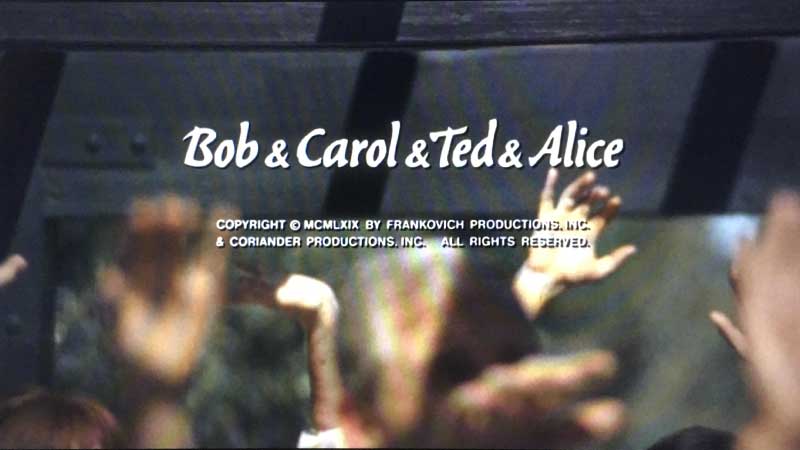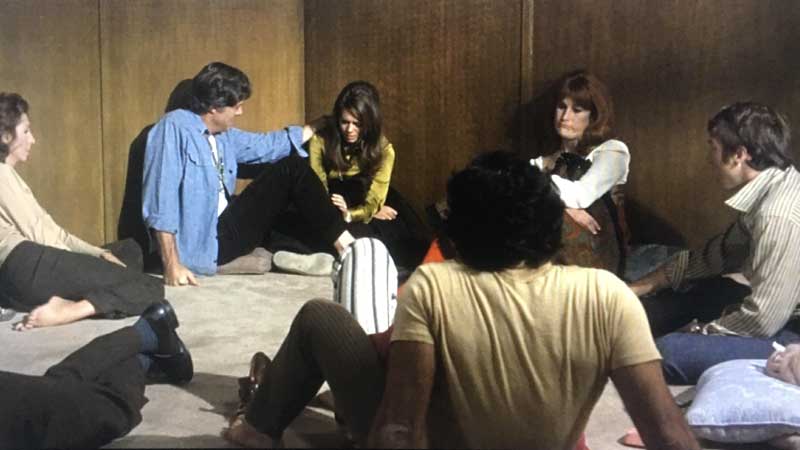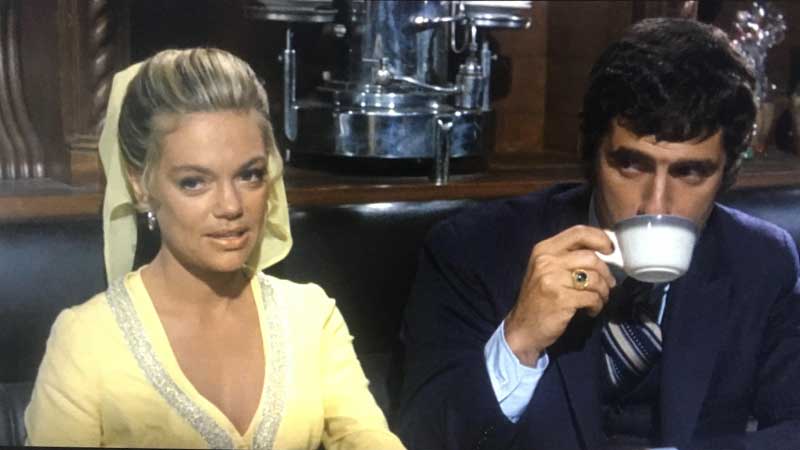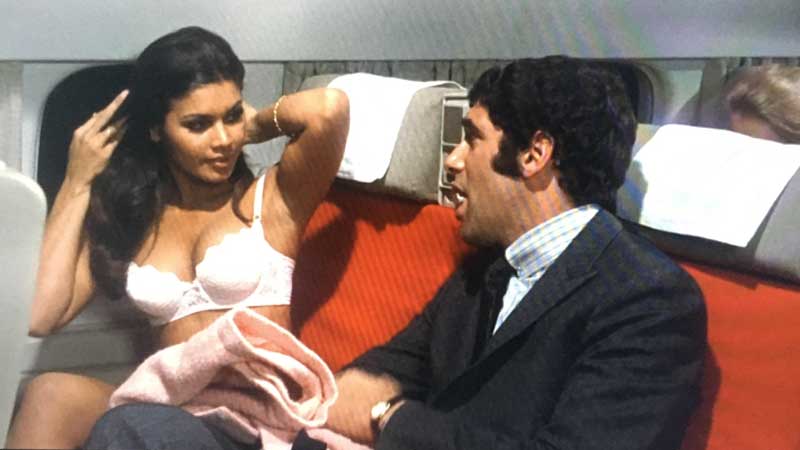| Reviews & Columns |
|
Reviews DVD TV on DVD Blu-ray 4K UHD International DVDs In Theaters Reviews by Studio Video Games Features Collector Series DVDs Easter Egg Database Interviews DVD Talk Radio Feature Articles Columns Anime Talk DVD Savant Horror DVDs The M.O.D. Squad Art House HD Talk Silent DVD
|
DVD Talk Forum |
|
|
| Resources |
|
DVD Price Search Customer Service #'s RCE Info Links |
|
Columns
|
|
|
Bob & Carol & Ted & Alice
Opening your mind and your bed

The images accompanying this review are for illustrative purposes only, and are not representative of the quality of the disc.
Loves: Great ‘60s films, black comedy
Likes: Elliott Gould, Natalie Wood
Dislikes: Self-centered people, new-age stuff
Hates: Adultery
The Movie
One's perception and reception of Bob & Carol & Ted & Alice will undoubtedly be colored by one's personal feelings about marriage and infidelity. The story follows two couples who come to a conflict after the one, Bob and Carol (Robert Culp and Natalie Wood), attends a new-age retreat that instills in them a new philosophy of openness and honesty. This leads to the revelation of an affair on Bob's part, which Carol takes in great stride, as it was a purely physical thing and is in the past. The more straight-laced Alice (Dyan Cannon) doesn't take the news of Bob's adultery quite as well, and it begins to impact her relationship with Ted (Elliott Gould). Their marriages are put to the test as a result of Bob and Carol's new way of thinking and it all comes to a head in a Las Vegas hotel room (a moment teased by the film's iconic poster art).
Directed by first-time feature-filmmaker Paul Mazursky (who, in addition to helping to create The Monkees, went on to become one of the ‘70s most critically-acclaimed directors), the satire/drama luxuriates in the intimate interaction between its characters, who engage in long conversations about their lives that might very well be considered boring today, but which reveal much about the characters (and also build some satire as well). This is a film about these people's lives, and as such Mazursky allows us to observe those lives, even in moments that don't directly move the plot forward. As a result, they become more than the situations they placed themselves in or find themselves in.

The other half of the titular foursome are no slouches either, as Cannon and Gould are key to the film. As Alice, Cannon is--in many ways--the center of the film, and a stand-in for most audiences, confused (and certainly thrown) by the ease at which Bob and Carol slip off the bonds of holy matrimony and give themselves to others. The pain she experiences while being beset by the changing mores around her is palpable, yet Cannon thankfully avoids tipping over into Reefer Madness-level histrionics. In her performance you can feel the torment of someone whose world has been turned upside down, and everything she ever wanted or believed is brought into question. As her husband, Gould is more of a source of genuine comedy, with his everyman persona used to great effect, keeping the mood light when it could easily get out of hand. One moment, in which he prepares for a buffet of erotic delights, says so much about the character without a word being spoken, and relies on Gould's ability to emote as well as anyone. It's hard to think of an actor of the time who could have slipped into this part and done as well at depicting a man who gets what he thinks he wanted rather than what he wants. Watching these two at work, particularly when along together, it's easy to see why they were the couple in the film that earned Oscar nominations.
Working with Old Hollywood DP Charles Lang and his soon-to-be frequent editorial collaborator Stuart Pappé, Mazursky reveals himself as a filmmaker as stylish as the era could offer without resorting to gimmicks. More than happy to let a shot play out (likely influenced by Lang's experience) Mazursky could also give himself over to spectacle, a fact made obvious by the film's opening montage of Californian sun and skin, set to a remixed "Hallelujah Chorus" that gets the movie off to a running start. He follows it up with a lengthy group therapy session that proves he's also unafraid to grind things to a halt to allow a scene to percolate and let his actors show their stuff. There's a very classic feel to much of the film's scenes, which has the effect of acting as contrast to the energy and modernity of the story playing out against it.
The reputation of Bob & Carol & Ted & Alice as a boundary-pushing exploration of sexuality is a holdover from the time of its release, when a movie about married folks happily cheating on each other and honestly discussing it (along with some casual drug use and front-and-center nudity) was a pearl-clutching seismic shock. Today, the film is markedly more tame than its poster might suggest, with more naked emotion than naked fun-times.

The Disc
Presented as part of Twilight Time's "Limited Edition" series (with a print run of just 3,000 copies), Bob & Carol & Ted & Alice arrives in a clear Blu-ray keepcase with the film's trademark image on the cover and the text poster's design on the inside. The Blu-ray disc has a static menu with options to watch the film, select scenes, adjust the setup and check out the extras. There are no audio options, while subtitles are available in English SDH.
The Quality
The 1.85:1, AVC-encoded 1080p transfer on this disc doesn't seem to be the result of a new master, but it doesn't suffer from those origins, as the image is quite nice, with a solid level of fine detail allowing your to see details in the production design, costuming and hair, while the color is well saturated and vibrant where appropriate (like the blue of Bob's bathrobe or the red of Alice's dress). There are some scenes that are softer than others, but this seems to be an issue with the film, rather than the transfer. Some very minor dirt or damage can be spotted here and there by the eagle-eyed, but it's very clean for the most part. Grain is consistent and pleasing, and there are no issues with digital distractions, making for an impressive image.
The film's DTS-HD Master Audio 1.0 track does the trick for this film, with a focus on dialogue, which is crisp and free of distortion, while the music and sound effects are blended well and given appropriate heft in the mix, with the focal music scenes giving themselves over to the songs, so they have the right power for the moment. A nightclub-like scene midway through the film, with funky diegetic party music is perfectly mixed, letting the crowd, the song and the voices mix together excellently, so you can hear what's said, but only in the way you would at a loud party. No issues here.
The Extras
Starting off with what's new to this release, we have a freshly-recorded commentary with film historians Julie Kirgo and Nick Redman, and it's everything you'd want from a track not featuring people involved with the making of the film. Bringing a wealth of info about the movie and Mazursky's career, they discuss the themes at play and the timeliness of the topics covered, explore the main actors' careers and put the film in the context of the time of its release (particularly in terms of the elements of nudity and sexuality.) It's the kind of engaging film lecture you want for a classic movie.
Also new is an isolated music track, which is great for listening to the opening music and Quincy Jones' contributions, along with the great pop song at the end, but Mazursky was extremely stingy with music here--there's just 17 minutes worth over the course of a 105-minute film. That's a lot of dead air, so scan to the good stuff.
In addition to these extras, Twilight Time pulled a pair from the previous DVD. First up is a commentary with Mazursky, Culp, Cannon and Gould. More of a good time with some friends reminiscing about the past than an informative track like Kirgo and Redman's, they share stories from the set (including off-screen experiences with pot) and also talk about some interesting cut scenes that are unfortunately not included for viewing. They also get caught watching at some points, resulting in spots of silence.
Also brought back from the DVD is the 17:45 "Tales of <Bob & Carol & Ted & Alice, an interview with Mazursky from 2003--produced for the original DVD--in which he discusses the origins of the film, making the movie and his personal film favorites. As made obvious from his leading presence on the commentary, Mazursky was an affable and down to earth gent, which makes this quite an enjoyable featurette.
Wrapping things up is a presentation of the entirety of the Twilight Time catalogue, available to peruse, with release dates and cover art.
In the package is an eight-page booklet featuring stills and poster art, as well as an essay by film historian Julie Kirgo, which talks of comedy and offers an overview of and insight into Bob & Carol & Ted & Alice.

Even if you've never seen Bob & Carol & Ted & Alice, there's a good chance you've heard about it, but it's nothing like its reputation. What it is is a remarkably confident directorial debut by Masursky, featuring a quartet of great performances in a story of changing times and what happens when people embrace honesty to its extreme outcomes. Twilight Time has delivered the film in great shape and put together a supplemental package that blends new and archival material into an easy purchase for cinephiles (or at least around 3,000 of them.)
Francis Rizzo III is a native Long Islander, where he works in academia. In his spare time, he enjoys watching hockey, writing and spending time with his wife, daughter and puppy.Follow him on Twitter
*The Reviewer's Bias section is an attempt to help readers use the review to its best effect. By knowing where the reviewer's biases lie on the film's subject matter, one can read the review with the right mindset.
|
| Popular Reviews |
| Sponsored Links |
|
|
| Sponsored Links |
|
|
| Release List | Reviews | Shop | Newsletter | Forum | DVD Giveaways | Blu-Ray | Advertise |
|
Copyright 2024 DVDTalk.com All Rights Reserved. Legal Info, Privacy Policy, Terms of Use,
Manage Preferences,
Your Privacy Choices | |||||||













